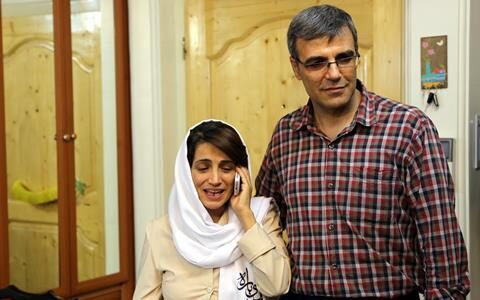Lawyer Nasrin Sotoudeh (L) and her husband, activist Reza Khandan, are both political detainees in Tehran’s Evin Prison
Co-written with William Christou and originally published by The Guardian:
EA on Brendan O’Connor Show: Ireland, Iran, Israel-Gaza, and Glastonbury
Life for Reza Khandan has only got worse since Tehran’s Evin Prison, where he was an inmate, was hit by an Israeli airstrike on June 23. The next night, the 60-year-old human rights activist – who was arrested in 2024 for his support of the Woman, Life, Freedom movement – was moved to another jail in the south of the capital, where he has told family conditions are hard to endure.
“My father and others do not have beds and are forced to sleep on the floor. He once found six or seven bedbugs in his blanket when he woke up,” said his daughter Mehraveh Khandan, who described “horrific” sanitary conditions in the prison.
Families of political prisoners in Iran say conditions have worsened since the end of the 12-day war and that they fear vulnerable detainees will bear the brunt of what activists say is a broader crackdown by the Iranian authorities, whose legitimacy was shaken by Israel’s campaign.
The fighting began on 13 June with a barrage of hundreds of Israeli airstrikes that Israel said were aimed at preventing Iran from obtaining a nuclear weapon. Iran quickly responded with a barrage of ballistic missiles and drones. The air war brought in the US and continued until both sides agreed a ceasefire.
An unknown number of prisoners were moved by the Iranian authorities to other detention facilities in the aftermath of Israel’s strike on Evin, which killed 71 people, including some in the jail and others in its vicinity. The whereabouts of many is unknown but those who have been in contact with relatives have said their new jails are even worse than Evin, which was notorious for the torture of political detainees.
Mehraveh, who is based in Amsterdam, said: “The only cooking water available to prisoners was salty until Sunday. [And] in recent days we have witnessed the disappearance of several prisoners who were already facing the death penalty or long sentences.”
Many families have not heard from their loved ones, as long queues have formed for the few phones in detention facilities. Asso Azizi, whose sister Pakhshan Azizi, a Kurdish aid worker, is on death row, said he had not heard from her in two days.
She and other women were transferred to Qarchak prison, which is described as overcrowded and unsanitary. “Unfortunately, they were not even able to take their personal and sanitary items with them,” Asso said.
Besides the unsanitary conditions, Asso is terrified that the authorities may expedite his sister’s death sentence, which she was handed in July 2024 “solely in relation to her peaceful humanitarian and human rights activities”, according to Amnesty International. The Iranian authorities charged her with armed rebellion against the state.
“There is a concern that just as the process of dealing with her case was very hasty and fast, confirming this sentence in only three days, that now they will execute this sentence to create terror among the people,” Asso said.


Iran struck five Israeli military bases during 12-day war: https://www.telegraph.co.uk/world-news/2025/07/05/iran-struck-five-israeli-military-bases-12-day-war/
“The new data were shared with The Telegraph by US academics at Oregon State University, who specialise in using satellite radar data to detect bomb damage in war zones. It suggests five previously unreported military facilities were hit by six Iranian missiles in the north, south and centre of Israel, including a major air base, an intelligence gathering centre and a logistics base.”
Human rights group, HRANA, publishes report on the human cost of the conflict between Israel/US and Iran: https://www.en-hrana.org/wp-content/uploads/2025/06/A-Comprehensive-Report-on-the-Iran-Israel-War.pdf
[Editor’s Note: There is no verification that this claim from an Iranian outlet is an accurate representation of Naji’s report from Tel Aviv.]
BBC correspondent (Kasra Naji) in Israel: Here in the center of Tel Aviv, everywhere is destroyed and the destruction is widespread / We are not allowed to report on the damaged military areas: https://www.asriran.com/fa/news/1073345
“The BBC’s Kasra Naji said of the extent of the destruction in Tel Aviv as a result of the Iranian attacks: “The filming of Israel’s damaged military areas is not allowed: Here in the center of Tel Aviv, everywhere is in ruins and the destruction is widespread; we cannot even report on the military areas that were hit. Many Israeli analysts believe that the war with Iran cost a lot and was not worth it; they believe that the war stopped in time.”
[Editor’s Note: The video is authentic. The framing of the video as “destruction of the center of Tel Aviv” is the editorial comment of the Islamic Republic’s Iranic TV.]
The video is authentic and relates to a live broadcast on BBC Persian: https://www.youtube.com/watch?v=Cf6LRva4RSE
Kasra Naji reports on the ground – without saying exactly where in Tel Aviv – the site of an Iranian missile impact and describing the destruction of an entire neighborhood that was once bristling with cafes and restaurants.
Iran’s Missiles Obliterated Israeli Neighborhoods: https://www.haaretz.com/israel-news/2025-06-30/ty-article-magazine/.premium/chilling-maps-show-irans-missiles-obliterated-israeli-neighborhoods/00000197-c0b4-dddf-a7ff-c6be957d0000
More evidence of the widespread destruction caused by three dozen missiles that impacted on populated areas.